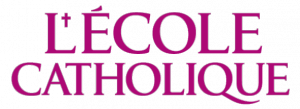
The priority for L’École catholique is to provide students with all the tools they require for success. That is why we strive to provide education that is adapted to the particular needs of each student. As such, our schools offer diverse and innovative programs and services, and apply various teaching methods that allow students to reach their full potential. Whether it’s to help them pursue their passions or to deliver special educational assistance, our schools listen to their students. Our qualified staff will suggest the best avenues for fulfilling their aspirations or meeting their challenges. Each school offers many unique options worth exploring, but here are a few examples that can be found in most of our schools.
Participative Teaching
This teaching method focuses on knowledge sharing and allows students to take an active role in creating their learning program. This approach also develops their cooperative spirit, critical thinking and communication skills. Students work in small groups on a variety of learning activities to enhance their understanding of a topic.
The inquiry process is a good example of this. It involves curiosity, exploration, research and collaboration. The teacher finds opportunities to inquire through student questions, through a shared experience, or through anything else that might be of interest to the whole class.
There are also “Classes nature”, a brand new program launched by the Conseil des écoles catholiques du Centre-Est (CECCE). This program offers elementary students an authentic and stimulating outdoor learning experience in every season. Students engage in gatherings, hikes, sensory experiences, observation, art projects, and other activities at least once a week. Each child’s holistic growth takes place through exploration, free play and discoveries guided by interests and intrinsic motivations. In this environment, they learn to develop their vocabulary and literacy as well as integrate numeracy concepts. Learning is child-centred and develops listening, speaking and problem-solving skills. This program also teaches them the importance of nature and of Indigenous traditions, among other components.
Another example is experiential learning, which allows students to learn in a variety of settings, both in and out of the classroom. For example, our schools offer programs such as the Specialist High Skills Major (SHSM), Cooperative Education (COOP) and the Ontario Youth Apprenticeship Program (OYAP). These programs help students in a variety of ways:
- Gain a better understanding of the industries in which they may want to work in the future.
- Discover career paths that they might not otherwise know about or consider.
- Learn essential skills for the job market.
- See how concepts learned in the classroom can be applied in the workplace.
- Make more informed decisions about their education and career paths, to make a successful transition into the workforce.
A last example of participatory education is the EcoSchools certification, discussed briefly in our last blog post, Green initiatives and summer challenges. Participating schools develop a variety of student-initiated and student-led projects that promote environmental learning and climate action.
Adaptive Learning
Our schools use a variety of adaptive education methods that involve adjusting the teaching style to meet the individual needs of students.
Here are some examples of programs that support adaptive learning:
- Differentiated education involves varied teaching styles to give all students a fair chance to succeed. Teachers learn about each student’s interests, strengths, needs, and what distracts or catches their attention. Planning is well thought out, intentional and, most importantly, flexible, both in the organization of the physical space of the classroom and in the choice of learning resources and assessment methods.
- Virtual learning teaches students how to safely and effectively use new technologies, a skill that is and will remain essential for future generations in their daily and professional lives. This type of learning helps students develop their ability to adapt; examples include the École branchée, the Virtual Personalized Education Centre, the Virtual Learning Academy, Explor’A and flexible classrooms.
- In the international education program, all elementary students learn French, English and Spanish. Learning can be achieved through games, songs, collaboration with peers and authentic activities. This allows students to develop language skills that help them move forward with learning a new language, a competitive advantage to have at provincial, national and international levels. In most schools, students have access to a variety of technological tools to help them learn.
- The French as a Second Language (FSL) program addresses the needs of students for whom French isn’t the home’s main language, and who have limited knowledge of French. This program is usually offered in a classroom setting or in a more intensive format. It supports every student’s success in our schools by allowing them to develop the language skills which are essential to learning and studying in French.
- Special education programs and services essentially consist of a variety of individualized teaching methods for children with behavioural, communication, intellectual, physical or multiple exceptionalities. Examples include Individual Education Plans (IEPs), transition plans, psychological, speech therapy, social work, special education services, and more. Some of our schools also have multi-sensory rooms, Snoezelen rooms and relaxation areas.
Advanced Education
Finally, our schools also offer advanced learning opportunities for academically gifted students and those who wish to learn beyond the core curriculum. These include enrichment programs, which focus on critical thinking, creative thinking, logical thinking and self-regulation to further meet the needs of students with high potential. There are also dual credit programs (DRC), which are usually offered in partnership with La Cité and Collège Boréal. DRC courses allow students to take college or apprenticeship courses while earning credits towards their Ontario Secondary School Diploma (OSSD). Dual credit programs are all approved by the Ministry of Education and the credits earned are valid in most postsecondary pathways.
In conclusion, all of our staff work tirelessly to provide each student with personalized services that support their success. The examples presented are just a small sample of the many ways we are working to meet the needs of our students. To learn more about the programs available in your school board or in a particular school, please visit their website, or contact them by phone or email.
In order to bring you a variety of relevant content, we’d love to hear what topics interest you and are important to you. Send us a private message on Facebook or Instagram if there’s a particular topic you would like to know more about.
Our articles are published sporadically, so follow us on social media to make sure you don’t miss anything!
Resources
- CSDCEO, Apprentissage par expérience — (2022). URL: https://csdceo.ca/fr/ecoles/apprentissage-par-experience (in French only)
- CSDCEO —Programme international à l’élémentaire — (2022). URL: https://csdceo.ca/fr/ecoles/programme-international-a-lelementaire (in French only) Franco-Nord, Intégration de la technologie et virage au 21e siècle — (2021). URL: https://www.franco-nord.ca/Programmes-et-Services/Pour-tous-les-%C3%A9l%C3%A8ves/Int%C3%A9gration-de-la-technologie-et-virage-au-21e-si%C3%A8cle (in French only)
- Csc Nouvelon, Programme ALF — (sans date). URL: https://www.nouvelon.ca/education/actualisation-linguistique-du-francais (in French only)
- Csc Providence, Enfance en difficulté — (sans date). URL: https://www.cscprovidence.ca/apps/pages/index.jsp?uREC_ID=1091992&type=d&pREC_ID=1368328 (in French only)
- CECCE, Classes Nature (2022). URL: https://www.ecolecatholique.ca/classesnature (in French only)
- CscProvidence, Dual credit programs (DRC) — (no date). URL: https://www.cscprovidence.ca/apps/pages/index.jsp?uREC_ID=1109036&type=d&pREC_ID=1368314 (in French only)
- CECCE, dual credit program courses (DRC) — (no date). URL: https://www.ecolecatholique.ca/fr/Cours-A-Double-Reconnaissance_229 (in French only)
- Csc Nouvelon, Célébration de l’ouverture officielle de la salle multisensorielle à l’école St-Charles Borromée — (2013). URL: https://www.nouvelon.ca/nouvelles/communiques-de-presse/312-celebration-de-l-ouverture-officielle-de-la-salle-multisensorielle-a-l-ecole-st-charles-borromee (in French only)
- Csc MonAvenir, Intégration de nos élèves ayant des handicaps multiples — (2021). URL: https://www.cscmonavenir.ca/wp-content/uploads/2021/02/5.2.2-Integration-de-nos-eleves-ayant-des-handicaps-multiples-janvier.pdf (in French only)


